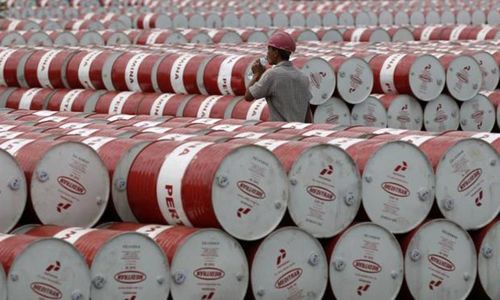ISLAMABAD: The government on Tuesday increased the prices of all petroleum products by three to 8pc with immediate effect for next 16 days.
According to an announcement by the Ministry of Finance, the ex-depot prices of high-speed diesel (HSD) and petrol were increased by Rs3 per litre while the prices of kerosene and light diesel oil (LDO) were jacked up by Rs5 per litre.
In doing so, the government took a significant revenue hit and reduced petroleum levy on petrol by about Rs4.50 per litre and about Rs2.51 per litre on HSD. On the other hand, it reduced petrol levy on kerosene by about 55 paisa per unit and increased by about 65 paisa per litre on LDO.
As such, the ex-depot price of HSD was fixed at Rs108.44 per litre instead of existing rate of Rs105.43 per litre, showing an increase of Rs3 (2.84pc). The HSD is mostly used in heavy transport vehicles, trains and agricultural engines like trucks, buses, tractors, tube-wells and threshers etc. This is one of the key contributors to inflation.
The ex-depot price of petrol was also set at Rs103.69 per litre instead of Rs100.69, showing an increase of Rs3 per litre or 2.97pc. Petrol is mostly used in private transport, small vehicles, rickshaws and two-wheelers.
The ex-depot price of kerosene was increased by Rs5 per litre (7.65pc) to Rs70.29 per litre instead of existing rate of Rs65.29. Kerosene oil is mostly used by unscrupulous elements for mixing with petrol and to some extent for lighting in very remote areas.
Likewise, the ex-depot rate of LDO was also increased by 7.95pc or Rs5 per litre to Rs67.86 per litre from its existing rate of Rs62.86. LDO is consumed by flour mills and a couple of power plants.
In revising the prices of petroleum products, the government did not pass on the full impact of increase in international prices in an apparent attempt not to affect a nascent declining trend in the rate of inflation.
It reduced petroleum levy on petrol by about Rs4.50 per litre to about Rs24.15 from Rs28.68 at present and about Rs2.50 per litre reduction in levy on HSD to Rs25.08 per litre from Rs27.57. Had the government kept the tax rates unchanged, petrol prices would have been higher.
Likewise, the petroleum levy on kerosene was reduced to Rs5.55 per litre from Rs6.10. On the other hand, it increase levy on LDO by 65 paisa per litre from zero to round off the increase.
The government is currently charging a standard rate of 17pc general sales tax (GST) across the board to generate additional revenues while petroleum levy is slightly lower than maximum permissible limit. Until January last year, the government was charging 0.5pc GST on LDO, 2pc on kerosene, 8pc on petrol and 13pc on HSD.
As such, the government is now charging a total of about Rs42 per litre tax on petrol and about Rs59 per litre on HSD.
Over the last few months, the government has been increasing petroleum levy rates instead of GST as levy remains in the federal kitty while GST goes to the divisible pool taxes and thus about 57pc cent share is grabbed by the provinces.
The petrol and HSD are two major products that generate most of revenue for the government because of their massive and yet growing consumption in the country. Average petrol sales are touching 700,000 tonnes per month against the monthly consumption of around 600,000 tonnes of HSD. The sales of kerosene oil and LDO are generally less than 11,000 and 2,000 tonnes per month per respectively.
Under the revised mechanism, oil prices are revised by the government on a fortnightly basis to pass on international prices published in Platt’s Oilgram instead of previous mechanism of monthly calculations on the basis of import cost of the Pakistan State Oil at present.
Published in Dawn, December 16th, 2020















































